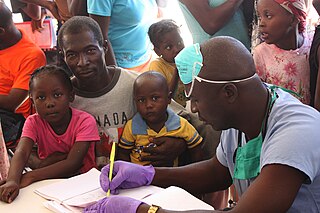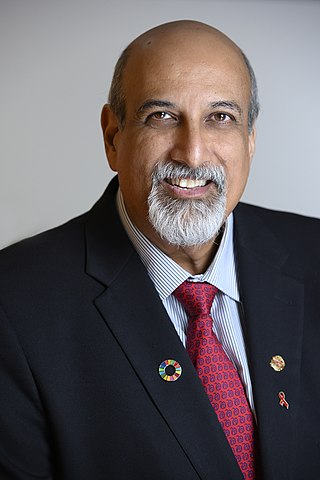Related Research Articles

Partners In Health (PIH) is an international nonprofit public health organization founded in 1987 by Paul Farmer, Ophelia Dahl, Thomas J. White, Todd McCormack, and Jim Yong Kim.
The European and Developing Countries Clinical Trials Partnership (EDCTP) is a partnership between the European Union (EU), Norway, Switzerland and developing countries and other donors, as well as the pharmaceutical industry, to enable clinical trials and the development of new medicines and vaccines against HIV/AIDS, tuberculosis, and malaria. The need for global action against these diseases in order to promote poverty reduction has been recognised by the United Nations, the G8, and the African Union, and the program envisioned the provision of €600 million for the period 2003–2007 in order to translate medical research results into clinical applications relevant to the needs of developing countries.

The AIDS Clinical Trials Group network (ACTG) is one of the largest HIV clinical trials organizations in the world, playing a major role in setting standards of care for HIV infection and opportunistic diseases related to HIV and AIDS in the United States and the developing world. The ACTG is composed of, and directed by, leading clinical scientists in HIV/AIDS therapeutic research. The ACTG is funded by the Department of Health and Human Services, National Institutes of Health through the National Institute of Allergy and Infectious Diseases.
TB Alliance is a not-for-profit product development partnership (PDP) dedicated to the discovery and development of new, faster-acting and affordable tuberculosis (TB) medicines. Since its inception in 2000, TB Alliance has worked to grow the field of available treatments for TB and now manages the largest pipeline of new TB drugs in history. It was founded in Cape Town, South Africa, and has since expanded. It is headquartered in New York City and has a regional office in Pretoria.

Tuberculosis is a serious public health problem in China. China has the world's third largest cases of tuberculosis, but progress in tuberculosis control was slow during the 1990s. Detection of tuberculosis had stagnated at around 30% of the estimated total of new cases, and multidrug-resistant tuberculosis was a major problem. These signs of inadequate tuberculosis control can be linked to a malfunctioning health system. The spread of severe acute respiratory syndrome (SARS) in 2003, brought to light substantial weaknesses in the country's public health system. After the government realized the impact that the SARS outbreak had on the country, they increased leadership in their health department. After the SARS epidemic was brought under control, the government increased its commitment and leadership to tackle public health problems and, among other efforts, increased public health funding, revised laws that concerned the control of infectious diseases, implemented the world's largest internet-based disease reporting system to improve transparency, reach and speed, and started a program to rebuild local public health facilities and national infrastructure.
The Centre for Infectious Disease Research in Zambia (CIDRZ) is a non-profit organisation founded in 2001 as collaboration between the University of Alabama at Birmingham, USA, the Ministry of Health of Zambia and the University of Zambia School of Medicine. In 2011 CIDRZ became an independent, Zambian, non-governmental organisation able to collaborate with multiple local and international universities.
Since the first HIV/AIDS case in Laos was identified in 1990, the number of infections has continued to grow. In 2005, UNAIDS estimated that 3,700 people in Laos were living with HIV.

HIV/AIDS in Lesotho constitutes a very serious threat to Basotho and to Lesotho's economic development. Since its initial detection in 1986, HIV/AIDS has spread at alarming rates in Lesotho. In 2000, King Letsie III declared HIV/AIDS a natural disaster. According to the Joint United Nations Programme on HIV/AIDS (UNAIDS) in 2016, Lesotho's adult prevalence rate of 25% is the second highest in the world, following Eswatini.
HIV/AIDS in Eswatini was first reported in 1986 but has since reached epidemic proportions. As of 2016, Eswatini had the highest prevalence of HIV among adults aged 15 to 49 in the world (27.2%).
HIV/AIDS is considered the deadliest epidemic in the 21st century. It is transmitted through sex, intravenous drug use and mother-to-child transmission. Zambia is experiencing a generalized HIV/AIDS epidemic, with a national HIV prevalence rate of 11.3% among adults ages 15 to 49 as of 2018. Per the 2000 Zambian census, the people affected by HIV/AIDS constituted 15% of the total population, amounting to one million, of which 60% were women. The pandemic results in increased number of orphans, with an estimated 600,000 orphans in the country. It was prevalent more in urban areas compared to rural and among all provinces, Copperbelt Province and Lusaka Province had higher occurrence.
With less than 0.1 percent of the population estimated to be HIV-positive, Bangladesh is a low HIV-prevalence country.
The Dominican Republic has a 0.7 percent prevalence rate of HIV/AIDS, among the lowest percentage-wise in the Caribbean region. However, it has the second most cases in the Caribbean region in total web|url=http://www.avert.org/caribbean-hiv-aids-statistics.htm |title=Caribbean HIV & AIDS Statistics|date=21 July 2015}}</ref> with an estimated 46,000 HIV/AIDS-positive Dominicans as of 2013.

HIV/AIDS was first detected in Canada in 1982. In 2018, there were approximately 62,050 people living with HIV/AIDS in Canada. It was estimated that 8,300 people were living with undiagnosed HIV in 2018. Mortality has decreased due to medical advances against HIV/AIDS, especially highly active antiretroviral therapy (HAART).
Global Health Initiatives (GHIs) are humanitarian initiatives that raise and disburse additional funds for infectious diseases – such as AIDS, tuberculosis, and malaria – for immunizations and for strengthening health systems in developing countries. GHIs classify a type of global initiative, which is defined as an organized effort integrating the involvement of organizations, individuals, and stakeholders around the world to address a global issue.

Sir Alimuddin Zumla,, FRCP, FRCPath, FRSB is a British-Zambian professor of infectious diseases and international health at University College London Medical School. He specialises in infectious and tropical diseases, clinical immunology, and internal medicine, with a special interest in HIV/AIDS, respiratory infections, and diseases of poverty. He is known for his leadership of infectious/tropical diseases research and capacity development activities. He was awarded a Knighthood in the 2017 Queens Birthday Honours list for services to public health and protection from infectious disease. In 2012, he was awarded Zambia's highest civilian honour, the Order of the Grand Commander of Distinguished services - First Division. In 2023, for the sixth consecutive year, Zumla was recognised by Clarivate Analytics, Web of Science as one of the world's top 1% most cited researchers. In 2021 Sir Zumla was elected as Fellow of The World Academy of Sciences.

Salim S. Abdool Karim, MBChB, MMed, MS(Epi), FFPHM, FFPath (Virol), DipData, PhD, DSc(hc), FRS is a South African public health physician, epidemiologist and virologist who has played a leading role in the AIDS and COVID-19 pandemic. His scientific contributions have impacted the landscape of HIV prevention and treatment, saving thousands of lives.
Nkandu Phoebe Luo is a Zambian microbiologist and politician who was a vice presidential candidate for the Patriotic Front in the August 2021 election. She is a microbiologist who previously served as Head of Pathology and Microbiology at the University Teaching Hospital in Lusaka and has carried out extensive research into HIV/AIDS.
Alash'le Grace Abimiku is a Nigerian executive director of the International Research Centre of Excellence at the Institute of Human Virology Nigeria and a professor of virology at the University of Maryland School of Medicine who takes interest in the prevention and treatment of HIV.
Etienne Karita is a Rwandan scientist who has been researching HIV/AIDS in Rwanda since the mid-1980s. He has held numerous leadership positions in different organizations that are working to control HIV in Rwanda. Some of his work is concentrated on preventing mother to child transmission of HIV and in collaboration with Projet San Francisco, he has studied HIV in discordant couples.
Haileyesus (Haile) Getahun is an Ethiopian global health leader, researcher, and advocate. He is currently the chief executive officer of HeDPAC, an organization dedicated to strengthening south-to-south partnerships in health development. Before this role, he served at the WHO headquarters in Geneva from 2003 to 2024, where he led numerous global health initiatives.
References
- ↑ Probert, William J M; Sauter, Rafael; Pickles, Michael; Cori, Anne; Bell-Mandla, Nomtha F; Bwalya, Justin; Abeler-Dörner, Lucie; Bock, Peter; Donnell, Deborah J; Floyd, Sian; Macleod, David; Piwowar-Manning, Estelle; Skalland, Timothy; Shanaube, Kwame; Wilson, Ethan (November 2022). "Projected outcomes of universal testing and treatment in a generalised HIV epidemic in Zambia and South Africa (the HPTN 071 [PopART] trial): a modelling study". The Lancet HIV. 9 (11): e771–e780. doi:10.1016/S2352-3018(22)00259-4. PMC 9646978 . PMID 36332654.